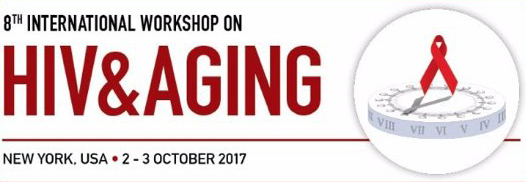Selected webcasts from 8th HIV and ageing workshop
28 November 2017. Related: Conference reports, Ageing and life expectancy, HIV and Ageing 2017.
 Simon Collins, HIV i-Base
Simon Collins, HIV i-Base
The following selected web coverage includes selected talks and perspectives from this workshop.
The community perspective – Jules Levin
The best introduction to this workshop is to watch the short talk by HIV activist Jules Levin who has been leading the demands for increasing appropriate funding and research on HIV and ageing.
Informed by personal experience of living with HIV, the talk sideswipes cure research, treatment interruptions and activist priorities – you are unlikely to agree with every opinion – but the talk is driven by the urgency of needing to address the realities of HIV and ageing.
In the US, as in the UK, the complexity of managing multiple co-morbidities is not possible with financial contracts that results in ever-shorter consultations and having to see multiple doctors who rarely talk to each other. Stigma continues, social isolation is widespread – and this is a growing population where the majority of people living with HIV are already older than 50.
New research approaches to treatments for Alzheimer’s disease – Mashav Thambisetty
With few current treatments – mainly palliative for symptom relief – and nothing since 2003. The current pipeline are also based on few therapeutic targets, with limited proof of concept data, and a history of risk of potential harm in additional to lack of benefit.
Successes in animal models and pre-clinical promise are so-far not matched in human studies. this includes working with a larger cohort of longitudinal samples from people with dementia, pre-dementia and unaffected controls to identify biomarker metabolites on the phenotypic pathway.
Potential role of metformin research in targeting ageing – Jamie James
Plans for future research using the antidiabetic drug metformin for it’s potential impact on the ageing processes to delay or prevent chronic diseases collectively, rather than one at a time. Although metformin is a widely-used insulin sensitiser it also has significant off-target effects that include extending lifespan and healthspan in animal studies.
Primary outcomes for the proposed randomised, placebo-controlled TAME study is likely to involve multiple morbidity composite endpoints including cardiovascular, cancer dementia and mortality. It is expected to need 3000 participants followed for 3 to 4 years.
See also: Barzilai N et al. Metformin as a Tool to Target Aging. Cell Metabollism, 23(6):1060–1065, doi: 10.1016/j.cmet.2016.05.011. (14 June 2016).
http://dx.doi.org/10.1016/j.cmet.2016.05.011
Exercise and ageing – Wendy Kohrt
An overview on the role of exercise on healthy and successful ageing – and the disconnect with normal ageing including a biological component to exercise that might drive lower activity levels as we age.
Currently, even a low bar of 150 minutes of moderate physical activity a week, is only met by around 50% of 18–25 year olds and30|% of those older than 65 with 50% of the older group reporting no activity (based on bouts of 10 minutes or more). This includes burning less calories as we age, at similar levels of activity and the impact of testosterone and estradiol on activity.
It also includes an outline or the planned US MoTrPAC study looking at benefits of exercise in 3000 mostly sedentary adults but also with a children’s cohort and physically active control group (www.motrpac.org).
Biology of superagers – Nor Barzilai
How ageing itself is the highest risk for all serious complications – approximately 1000-fold at >80 years old compared to being 20. This talk reviewed research in longevity from a cohort of >670 centenarians. These people not only live longer, but live disease-free with low health costs for most of this time.
However, as a population, llifestyle factors including obesity, smoking, alcohol and exercise etc were broadly similar to general US population. Also, genetic patterns commonly included pathogenic SNPs: longevity in centenarians is not explained by having fewer pathogenic genes. Although protective lipid-related genes (APOC3 and adiponectin) were present at higher levels, diminished IGF-1 and growth hormone was discussed as a pathway supported by human data with the potential for IGF-receptor antibodies as treatment.
Current reality: the New York experience – Eugenia Seigler
Examples of a HIV practice that includes a geriatrician in the team – while recognising that this also involved a broad range of needs for older HIV positive people than just assessment tools. The role of comprehensive geriatric assessment and whether this can help meet such complex psychosocial and long-term care needs.
The research perspective – Phyllis Tien
Review of how two large prospective cohort studies – especially MACS and WYSE – can inform issues relating to HIV and ageing.

